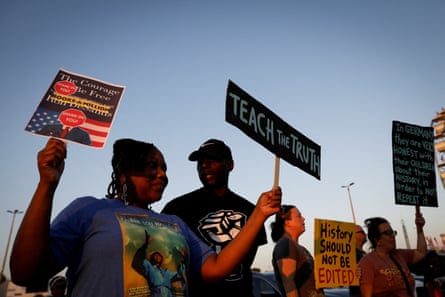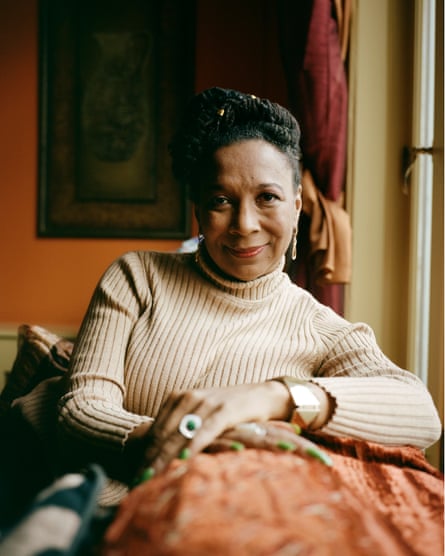
‘Just the tip of the iceberg’: Kimberlé Crenshaw warns against rightwing battle over critical race theory
Exclusive: Author and academic cautions pushback against racial justice education feeds revival of segregationist policies
‘Just the tip of the iceberg’: Kimberlé Crenshaw warns against rightwing battle over critical race theory
The professor who is a leading voice on critical race theory has warned that the rightwing battle against racial justice education not only threatens US democracy, but encourages a revival of segregationist values and policies.Kimberlé Crenshaw is among top American academics and authors recently stripped from the latest draft of the advanced placement (AP) African American studies course being piloted in US high schools, after Florida’s rightwing governor, Ron DeSantis, led an aggressive backlash against it.
The Columbia University and UCLA law professor and co-founder of the African American Policy Forum thinktank, believes that the escalations against racial history teaching, in Florida and elsewhere represent “the tip of the iceberg” of rightwing efforts to retract the progress since the civil rights era and push America towards authoritarianism.
“Are [schools] on the side of the neo-segregationist faction? Or are [they] going to stick with the commitments that we’ve all celebrated for the last 50, 60 years?” Crenshaw asked, referring to headway made on equal opportunities since the 1960s.
“The College Board fiasco, I think, is just the tip of the iceberg. There are a lot of interests that have to make this decision,” she said.
The College Board, the organization that administers college readiness exams and AP courses for high schoolers to earn college credits, denied bending to political pressure amid accusations that the curriculum has been watered down.
But in what many viewed as a response to DeSantis’s ban, the work of Crenshaw and other high-profile progressive Black figures, such as Ta-Nehisi Coates, were relegated from required reading to “optional” within the course.

People hold signs during a gathering outside a bookstore where the Florida governor was expected to be signing copies of his book. Photograph: Marco Bello/Reuters
Several topics, including intersectionality, queer studies and the Black Lives Matters movement, were downgraded. The new version of the course now suggests Black conservatism as a research project idea.
DeSantis, who will probably run for president in 2024, claimed the course violated state law and “lacks educational value”.
Even apart from outrage at states moving to ban the course outright, if the edited version ends up being the course’s final form when it is set to launch fully in 2024, Crenshaw cautions that states teaching the significantly pared-down version will see its students earning the same credits as those studying the fuller version that includes the kind of contemporary and intersectional material she views as vital.
Making such core topics optional “is exactly the same structure of segregation”, she said. “It’s like ‘we’re going to create this so that the anti-woke [camp] will permit states to decide whether they want the segregated version, or whether they want a more fully representative and inclusive version,’” said Crenshaw.
Crenshaw is widely known for her activism and scholarship on two essential schools of thought on anti-Black racism. She is a trailblazer in critical race theory, which explores the persistence of systemic racism in US legal institutions, pioneered by law professor Derrick Bell. And she coined the term intersectionality, in 1989, describing how different identities such as race, gender and sexuality cut across each other and overlap.
And from the previous draft last fall to the current version of the AP course, the key word “systemic” disappeared entirely and the word “intersectionality” went from several to a lone mention.

Thousands of protesters walk in a peaceful manner across the Brooklyn Bridge holding signs in June 2020. Photograph: Ira L Black/Corbis/Getty Images
Crenshaw said that the “frightening” choice in the new AP course to make contemporary lessons optional follows a similar logic to how corporations navigated Jim Crow segregation.


 Rolltide Roll
Rolltide Roll



